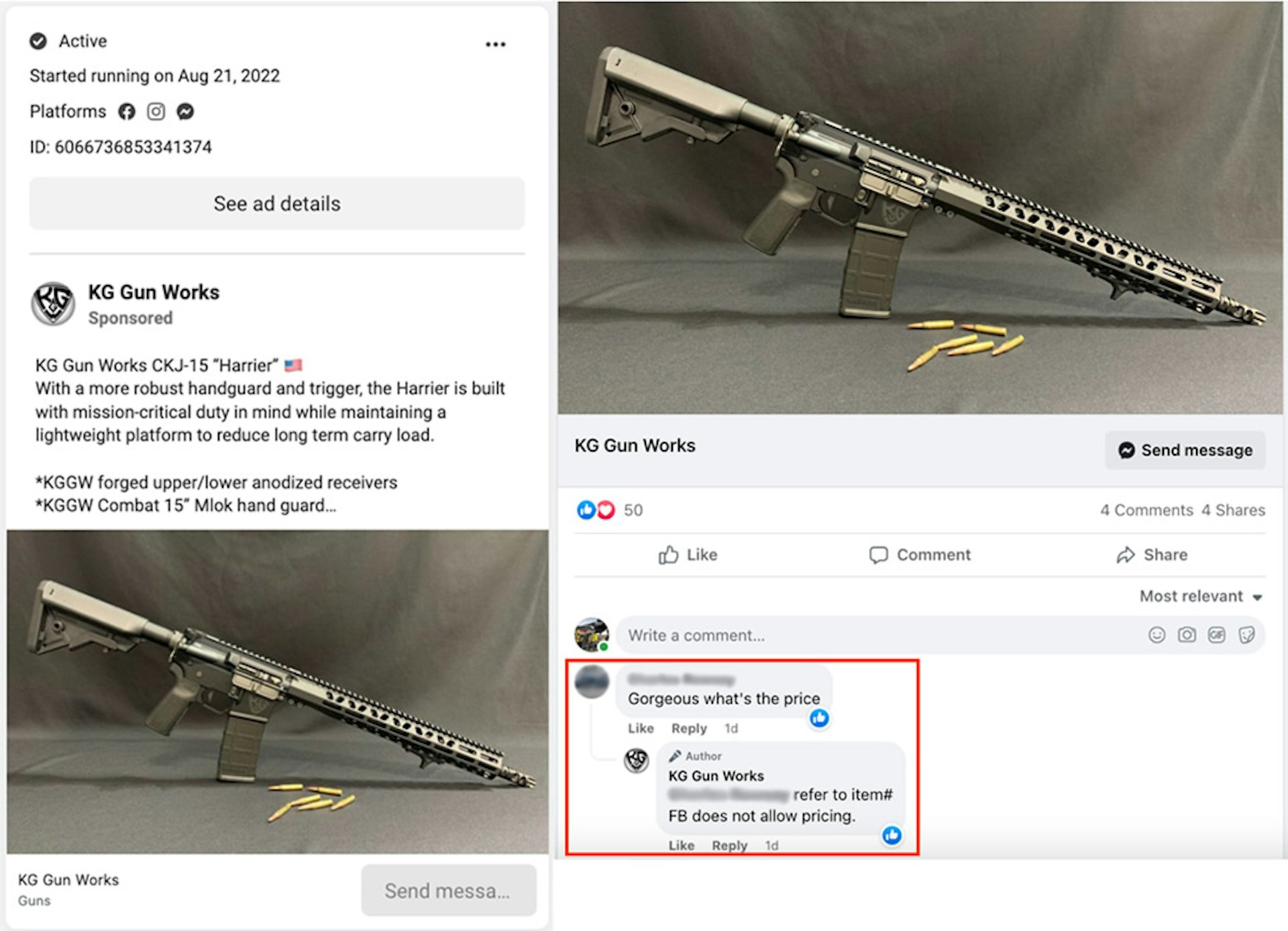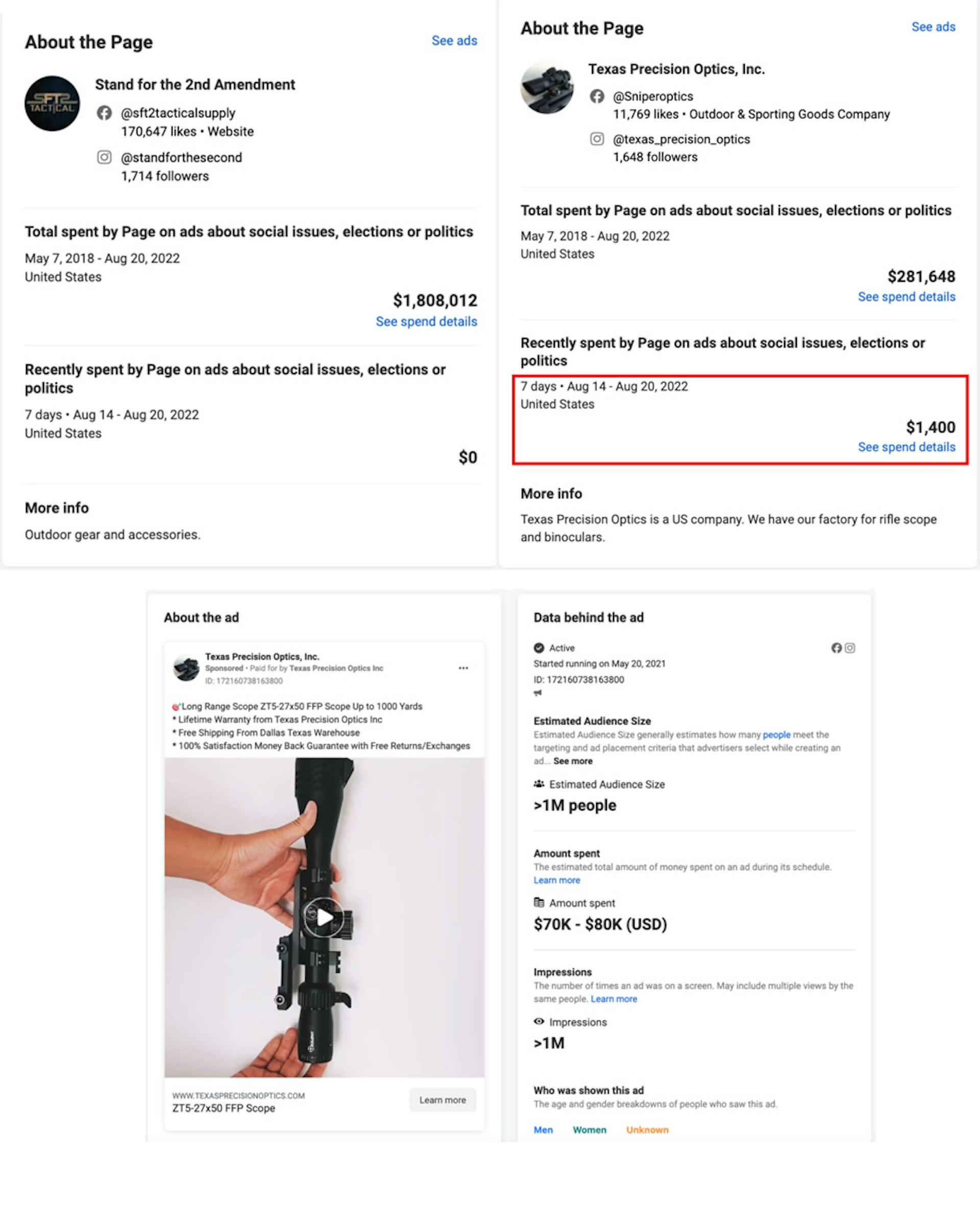Meta regularly approves ads for guns and gun accessories on Facebook and Instagram that violate its policies, according to a new Tech Transparency Project (TTP) investigation that shows how the company is profiting from the firearms industry.
TTP found 173 examples of ads with weapons-related content actively running on Facebook and Instagram during a two-week period between Aug. 15 and Aug. 29, 2022. Meta approved these ads, which offered various types of guns as well as scopes, sights, and gun-mounted lights, despite stating that advertising on its platforms must not “promote the sale or use of weapons, weapon modification accessories, ammunition, or explosives.”
Disturbingly, some of the ads identified by TTP marketed AR-15 style rifles—the weapon of choice for mass shooters in the United States—or accessories to use with an AR-15, with one ad for a rifle sight declaring, “EVERY AR-15 OWNER NEEDS THIS.”
The findings raise new questions about the effectiveness of Meta’s ad review system, which the company has said “relies primarily on automated technology.” And they give insight into how much revenue Facebook is generating from these violating ads, with some gun retailers spending hundreds of thousands of dollars on ad campaigns.
TTP’s research also highlights transparency problems with Meta’s Ad Library. Only those gun ads categorized as having to do with “issues, elections and politics” are preserved in the archive, making it difficult if not impossible to assess the full extent of firearms advertising on the company’s platforms.
Marketing Guns
Facebook says it prohibits the use of its ad platform to promote weapons and certain weapons accessories. But TTP’s investigation found multiple examples of approved Facebook and Instagram ads either promoting guns or a gun store’s inventory.
To identify these ads, TTP researchers entered a series of search terms into the Meta Ad Library search bar, including generic terms such as “guns” or “ammo,” as well as terms for particular types of firearms, including “AR-15,” “shotgun,” and “rifle.”
In one example, TTP found an approved ad from gun manufacturer and seller KG Gun Works that promoted the company’s AR-15 style assault rifle on Facebook, Instagram, and Messenger—with an image of the rifle and several rounds of ammunition.
In a reply to a comment on the AR-15 style rifle ad, KG Gun Works said it does not list the weapon’s price because it would violate Facebook policy. The exchange suggests that the company, while clearly promoting this rifle, tries to avoid text that could trigger a Facebook takedown. (This may in turn violate another Meta policy, which prohibits “tactics that are intended to circumvent our ad review process.”)

The text on another ad for a company called MMT Supply LLC promotes products that customers can buy in its Texas store, including “guns and ammo.” Across a number of different ads, this text is paired with product images, including, in one case, a dozen rifles and pistols mounted on a wall.

Facebook also approved an ad for MESS Industries, which is categorized as a “Gun Store” on its Facebook and Instagram pages. Clicking on the ad—which shows a photo of a handgun—takes the user to the advertiser’s page, which features the MESS Industries website. The site offers an array of weapons for sale, and the user can get to a product page for a “Custom built AR-15” in just a few clicks.
Scope, Sights, and Lights
TTP’s investigation found a total of 69 advertisements for gun scopes, sights, and mounted lights. All of these violate Facebook policy, which bans ads for products “that might be attached or used with a weapon to enhance or customize its form or function.”
To locate these ads, researchers used search terms specific to these accessory categories, including “rifle scope,” “rail mounted light,” and “iron sights.”

An ad from a page called “Stand for the 2nd Amendment”—one of several pages for gun accessory seller SFT2 Tactical—promotes its “AR-15 Five Piece Package.” The ad description includes the words “scope” and “sight.” (Meta’s policy on weapons ads specifically bans attachments used for optics, target magnification, and focus.)

Another ad from “The Tactical Revolution” contains the word “sight” and makes reference to “firing accuracy.” The text in the ad’s video thumbnail declares that “EVERY AR-15 OWNER NEEDS THIS” product.
Facebook paused U.S. ads for gun accessories and military gear in January 2021 after a BuzzFeed-TTP investigation found that Facebook was serving such ads next to election misinformation and content about the Jan. 6 insurrection. The company’s current policy on weapons ads continues to prohibit some of these products; however, the policy allows ads for protective vests, holsters, and gun cases to target users 18 and older.
Speed Loaders
TTP also discovered dozens of ads for speed loading devices—an accessory that promises to reduce the time it takes to load ammunition into a gun magazine. These devices are clearly weapons enhancements banned by Meta’s ad policy.

The brand Quick-Loader, a unit of Elite Tactical Systems (ETS), advertised a speed loader with the ability to reload “15 rounds in 7.5 seconds.”
Nearly all of Quick-Loader’s ads contain a disclaimer that reads, “We do not promote the sale of weapons or ammunition of any kind. We strictly sell a loading device that will make it easier to load your magazine.”
But the ads clearly promote accessories that can be used with a weapon to enhance its function—which Meta’s policy forbids. And the company appears to understand it’s in danger of having its content pulled down.
The “About” section of Quick-Loader’s Facebook page reads: “WE ARE ETS. This is one of our backup facebook accounts.” TTP has previously documented how users ranging from domestic extremists to “thinfluencers” use backup accounts on Facebook and Instagram to ensure they can continue to reach their audience even if one of their accounts is taken down.
On one of Quick-Loader’s other pages, “ETS-QuickMag,” a pinned post explains: “As you may notice and see we have multiple facebook pages. This is due to the lovely people at facebook wanting to censor our products.”

TTP found that a number of ads from the American Gun Owners Association—including two for speed loaders—contain a similar disclaimer in the ad description that reads: “We do NOT promote the sale of weapons or ammunition of any kind.”

It is not clear if these disclaimers are meant to convince Meta of compliance during the initial ad review process, or to dissuade users from reporting the ad for secondary review.
Gun Raffles
The TTP investigation identified 31 ads for gun raffles, in which individuals or organizations seek to raise money by raffling off weapons. Meta’s ad policy makes no specific mention of gun raffles, but it does state that ads cannot promote the “use of weapons.”
Two ads talked about raffling off an AR-15, with one giving the rifle’s retail value as $2,200. Another indicated that a gun raffle would be used to raise money for a youth football league; the ad listed 20 firearms, including handguns such as a Glock 48 9mm, a Beretta 92FS 9mm, and a Taurus G3C.

Critics recently slammed a similar gun raffle for a youth football group in North Carolina, calling it inappropriate for a kids’ organization, particularly against the backdrop of deadly school shootings.
Facebook's Haul
Meta’s Ad Library policy indicates that only those ads designated as having to do with “issues, elections and politics” must disclose the amount spent on them.
The weapons ads examined by TTP were commercial, not political, in nature, but because some of the ads were miscategorized as political, TTP was able to get some insight into how much some advertisers are spending to promote guns and gun accessories. (Facebook has a history of misclassifying ads as political.)
For example, between May 7, 2018 and August 20, 2022, Texas Precision Optics, Inc. and Stand for the 2nd Amendment spent $281,648 and $1,808,012, respectively, on gun-related ads. Both of these advertisers sell weapons accessories, and the ads in question, despite being marked as about “social issues, elections or politics,” were commercial in nature. (The “Stand for the 2nd Amendment” page is run by retailer SFT2 Tactical.)

Another interesting example: One speed loader ad from American Gun Owners Association, a firearms accessories seller, cost between $400 and $499. Like the above example, the amount spent was only visible in the Ad library because it was miscategorized as relating to “social issues, elections or politics.” The same brand ran 47 other ads not marked as political during the period examined by TTP. If a similar amount was spent on each of those 47 ads, that means this advertiser spent thousands of dollars on Meta advertising in just two weeks.

Meta’s Questionable Record-Keeping
Meta’s policy states that while all active ads are visible in its Ad Library, only those categorized as having to do with “social issues, elections or politics” are preserved in the archive once they become inactive.
This was reflected in TTP’s research. Of the 173 firearm-related ads identified during the August 15-29 observation period, 135 (78%) had disappeared from the Ad Library when TTP re-checked them on October 14, 2022—60 days after the start of the observation period. (The ones that remained were either miscategorized as socially or politically oriented—and thus preserved—or still active at that time.)

It’s not clear why Meta runs its Ad Library this way. But the policy makes it much harder for researchers to get a full picture of gun-related advertising on the company’s platforms, since the records of many of these ads simply vaporize. And it goes beyond guns: Anyone concerned about harmful Facebook or Instagram ads will be hampered by this lack of retrospective transparency. Conveniently, this also serves to obscure the revenue Meta is generating from ads that violate its policies.
Meta further confuses the matter by failing to specify why a non-political ad has become “inactive.” There is no way to tell how many of these ads simply ran their course and expired—or were removed by Facebook for a policy violation.
Conclusion
Facebook, now under parent company Meta, has a long and tortured history with guns. The company has repeatedly updated its firearm policies—see 2014, 2016, 2018, and 2021—amid criticism that it is too permissive about content promoting deadly weapons. The Washington Post reported this summer that Facebook gives gun sellers up to 10 strikes before booting them off the platform, sparking a new round of condemnations.
TTP’s findings shed light on another dimension of this issue, showing how Meta is regularly failing to enforce the rules it has on the books when it comes to gun-related advertising. Meta is not only allowing such content to reach users in violation of company policy, but it’s reaping a substantial amount of revenue from these ads.
TTP’s investigation also highlights how, despite its promises about transparency, Meta is only preserving a subset of these gun-related ads in its Ad Library, muddying the historical record about the presence of weapons-related advertising on its platforms.
Methodology
To find approved Facebook and Instagram ads for prohibited firearms and accessories, TTP researchers entered various terms into the Meta Ad Library search bar between August 15 and August 29, 2022. Search terms included, but were not limited to:
- Firearm brands/manufacturers: “Glock,” “Remington,” “Sig Sauer”
- Firearm types: “shotgun” “rifle” “AR-15”
- Accessory categories: “rifle scope” “rail mounted light” “iron sights”
- Ammunition calibers: “.22” “.45” “.223”
- General terminology: “guns and ammo” “gun raffle” “gun auction”
When researchers found and logged violating ads, they then navigated to that advertiser’s Meta Ad Library profile and logged any additional active ads promoting prohibited firearm-related products.
Researchers logged the ad ID and took a screenshot of each violating ad.
TTP researchers used the recorded ad IDs to periodically check the status of logged ads during the course of the observation period. TTP researchers then did a final count on October 14, 2022.




